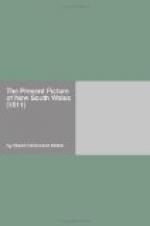That the trial by jury should be introduced into the colony, has long been a desideratum amongst the best-informed inhabitants of the colony; since its effects could not be otherwise than beneficial where such universal iniquity prevails, and where even in the courts of law many enter with impure motives and unclean hands; since the greater part of the community are more or less implicated in the notorious and impoverishing impositions which are continually practised amongst all classes. When I say that this blessing has been desired by the well-informed, I must also be understood to mean the well-intentioned only; for its establishment in the settlement would unavoidably prove fatal to that ruinous traffic, from which several of the superior classes have derived their opulence and consequence, and it is not therefore to be expected, that such as these would wish to behold the approach of that scourge which would remove from them the power of extending universal evil for the promotion of their individual good. By these persons the admission of the trial by jury is sincerely and ardently deprecated, while it is wished for with equal fervency by others, and particularly those oppressed inhabitants, whose miseries and necessities have been the means of increasing the wealth, and hardening the feelings of those who have so long pursued the destructive system of monopoly. It would not have been practicable to introduce the trial by jury at the commencement of the settlement, since there were none but convicts, and a few free persons who were paid and supported by the crown; but the case is now materially altered, and the great influx of free, independent, and respectable inhabitants, which the later years of the colony have witnessed, not only render such a measure practicable and prudent, but loudly call for it as a step rendered indispensable to the welfare of the community. Numbers have also served their terms of transportation, or have been made objects of royal bounty on account of their signal good conduct, and have thus swelled the numbers of free residents; so that there could be no difficulty in making out a list of jurors, sufficient for every purpose, even if the assizes were ordered to be held monthly, which is a more frequent occurrence than in the mother country. Objections may be started to the propriety of receiving those, who have been convicted and have suffered the sentence of the law, as jurors; but if this description of persons are worthy to be received as evidence at all in a court of justice, and there are instances sufficient on record to prove this to have been the case; and where this evidence of persons so objected to and proscribed, has been the sole means of the conviction to death of the accused, surely it could afford no room for cavil that a jury should in part be composed of persons, whose conduct during the term of their punishment has been such as to give general satisfaction, and who have proved by their conduct that they have reformed




